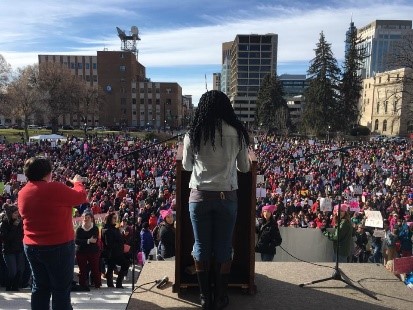Our Story
 The Idaho Coalition Against Sexual & Domestic Violence is a statewide nonprofit membership organization working to end gender violence fueled by multiple, systemic oppressions. We use the term gender violence in place of legal definitions like sexual assault, domestic violence, and sex trafficking to help us have a deeper conversation about the roots of this violence. We talk about gender violence to look closely at how strict gender roles and unfair power lead to violence against women, girls, and all genders which are oppressed. Our society only supports two gender identities, man (masculine) and woman (feminine) and expects all of us to fit the role we are assigned. We also live in a world where men are more valued and are given more power than any other gender. These forces lead to alarming rates of violence against women, girls, and all genders which are oppressed. We see the movement to end gender violence as a key strategy in ending all forms of violence.
The Idaho Coalition Against Sexual & Domestic Violence is a statewide nonprofit membership organization working to end gender violence fueled by multiple, systemic oppressions. We use the term gender violence in place of legal definitions like sexual assault, domestic violence, and sex trafficking to help us have a deeper conversation about the roots of this violence. We talk about gender violence to look closely at how strict gender roles and unfair power lead to violence against women, girls, and all genders which are oppressed. Our society only supports two gender identities, man (masculine) and woman (feminine) and expects all of us to fit the role we are assigned. We also live in a world where men are more valued and are given more power than any other gender. These forces lead to alarming rates of violence against women, girls, and all genders which are oppressed. We see the movement to end gender violence as a key strategy in ending all forms of violence.
Multiple, Intersecting Systemic Oppressions
Gender Violence occurs at such alarming rates because it is fueled and supported by multiple, intersecting systemic oppressions – sexism, racism, classism/poverty, able-ism, anti-immigrant or anti-refugee status. We use the term systemic oppression to describe the larger forces which dominate and harm certain groups of people. These forces go beyond individual behaviors of discrimination and mistreatment. Systemic oppressions, like racism, play out through institutions, power structures, cultural beliefs, and other systems. They are powerful systems of inequality that were intentionally created in our history and continue to harm communities – sometimes without our knowing. We believe that we cannot end gender violence without interrupting these massive systems which prevent all of us from thriving. It can feel overwhelming when we figure out it is not enough to address gender violence and that we need to look at the deeper issues! But we can do this in the anti-violence field by centering solutions on the individual in any community who has the least opportunities, the most barriers – and ensure our strategies/approaches/services take into account multiple systemic oppressions.
Naming of Girls and Women and People Who are Gender Oppressed
In conversations about gender violence, we lift up the experiences of girls and women. Gender violence overwhelmingly impacts women and girls, and their experiences help us to better understand the root causes of violence. When we acknowledge this in our conversations about gender violence, we can highlight the ways in which women and girls are given less power in our society and are intentionally targeted by this violence. In our focus on girls and women, we cannot dismiss the experiences of other genders. Many people are oppressed simply because they identify or act outside of the socially constructed gender roles in our society, including men and boys. We see these restrictive experiences at the center of our work as well. All genders deserve the opportunity to thrive and anyone impacted by violence deserves compassion. There have been many efforts to create a more gender neutral conversation about violence and we feel that this distracts us from seeing the root causes and creating real solutions. While we seek to interrupt all violence, we wish to be intentional about framing our conversations around those who are frequently impacted, and often silenced the most.
Collective Liberation
We value and work towards collective liberation –if one group of people is valued less or more than another and has less or more power based on an identity or characteristic (gender, race, ethnicity, ability, class, sexual orientation, immigration status), then none of us are truly free to thrive and live to our full potential. None of us choose the body or identity into which we are born. Oppression and inequality attempt to force us into playing the role we were assigned. While the dominant groups in society benefit from this inequality, they are still trapped and unable to reach their full potential. We all have a mutual interest in ending oppression and amplifying the voices of people and communities who are the most marginalized. We are all connected and must continue to work towards collective liberation for all.